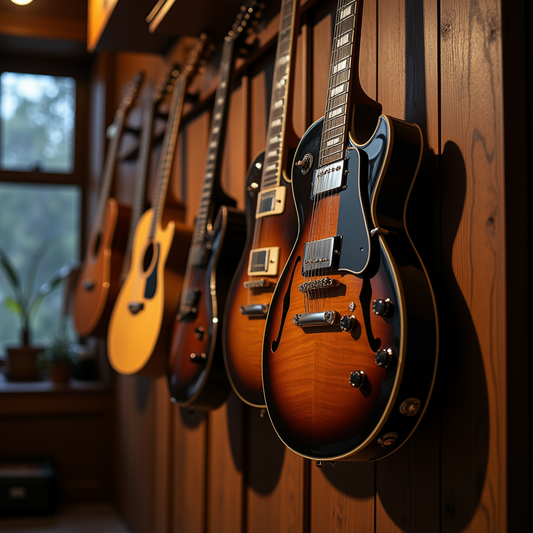Top 10 Common Pitfalls: Beginner Guitar Mistakes
Share
Introduction
Learning to play the guitar is truly an exciting and fulfilling adventure. It's like embarking on a journey into a world filled with harmonious melodies and rhythmic beats. However, for those just starting out, there are numerous hurdles and common mistakes that can act as stumbling blocks on this musical path. In this blog, we're going to delve deep into the top 10 common pitfalls that beginner guitarists frequently encounter, and also provide some valuable tips on how to avoid them. This knowledge will be like a guiding light for new guitar players, helping them to find their way onto the right track and relish their musical exploration more effectively.
Body
Mistake 1: Incorrect Posture
-
One of the most elemental mistakes that beginners make is having improper posture while playing the guitar. Good posture is of utmost importance for several reasons. It's not just about being comfortable during those long practice sessions; it's also a crucial factor that influences the sound quality and the ability to execute complex chords and techniques.
-
Picture this: many beginners tend to slouch or hold the guitar in a rather awkward position. For example, some might hold the guitar too low or too high. This can be compared to a builder trying to construct a house with a wobbly foundation. When the guitar is held too low or too high, it can put a strain on the wrists, much like a runner with ill - fitting shoes. This makes it arduous to reach the fretboard accurately. The correct posture involves sitting upright, with the guitar resting comfortably on the thigh. The back should be as straight as a rod, and the shoulders should be relaxed. This posture is like a key that unlocks better access to all parts of the guitar and reduces the risk of developing muscle pain or injury over time. It's like a well - oiled machine; when everything is in the right position, it functions smoothly.
Mistake 2: Ignoring Tuning
-
Beginners often fail to recognize the significance of tuning their guitar. A guitar that is out of tune can sound as dreadful as a screeching cat. It can also make it extremely difficult to learn new chords and melodies. Tuning is the bedrock of good sound.
-
There are some new players who might not even have a clue about how to tune their guitar or are simply too indolent to do it on a regular basis. There are several ways to tune a guitar, such as using a tuning fork, an electronic tuner, or tuning apps on smartphones. It's highly recommended to tune the guitar before each practice session. This is like ensuring that all the gears in a complex machinery are in perfect alignment. When the guitar is tuned, the notes are in harmony, and the learner receives accurate feedback when playing, much like a navigator getting correct signals.
Mistake 3: Rushing Through Basics
-
Many enthusiastic beginners are in such a hurry to play their beloved songs that they skip over the fundamental basics. The basics are like the cornerstones of a grand building. Without a firm understanding of chords, scales, and finger placement, it becomes almost impossible to progress to more advanced playing.
-
Consider this scenario: they might attempt to play complex riffs without first having a good grasp of simple chord transitions. This is similar to trying to build the upper floors of a building without first constructing a solid foundation. It can lead to frustration, which can be as suffocating as a thick fog, and a lack of confidence in their playing ability. It is essential to spend time on the basics, such as learning how to form open chords correctly, how to strum evenly, and how to move fingers between different positions on the fretboard. This is like laying one brick at a time to build a strong musical structure.
Mistake 4: Overusing the Pick
-
Some beginners place too much reliance on the pick when playing the guitar. While the pick can be a useful tool for creating a bright and distinct sound, overusing it can be like putting all your eggs in one basket and limit the player's versatility.
-
There are numerous techniques that demand the use of fingers instead of the pick, such as fingerpicking. Fingerpicking can create a softer, more nuanced sound, much like a gentle breeze on a warm summer day. It can be used to play a vast array of musical styles, from the elegance of classical to the earthy charm of folk. Beginners should experiment with both pick and finger techniques to expand their playing capabilities, just as a painter experiments with different brushes to create diverse artworks.
Mistake 5: Not Practicing Regularly
-
Consistent practice is the golden key to improving on the guitar. However, many beginners start with great enthusiasm but then lose their motivation and fail to practice regularly. Regular practice is like a magical potion that forms muscle memory and enhances coordination.
-
Life can be full of distractions, but setting aside a specific time each day or week for guitar practice can have a profound impact. Even short practice sessions of 15 - 30 minutes a day can be more effective than long, sporadic practice sessions. It's like watering a plant regularly; small but consistent efforts yield better results. It is also important to have a practice plan, focusing on different aspects of playing such as chords, scales, and songs during each session. This is like following a map on a journey; it gives direction and purpose.
Mistake 6: Poor Strumming Technique
-
Strumming is an art form in itself, and beginners often struggle to develop a good strumming technique. They may strum too forcefully or too gently, or have an inconsistent rhythm, much like a novice dancer trying to find the right tempo.
-
A common problem is not using the correct part of the hand for strumming. The thumb and fingers should work in harmony, like a well - rehearsed choir. Beginners can start by practicing simple strumming patterns on open chords, gradually increasing the complexity as they gain more confidence. This is like learning to walk before running; it builds a solid foundation.
Mistake 7: Focusing Only on One Genre
-
Some beginner guitarists become fixated on a single genre of music, such as rock or pop. While having a favorite genre is wonderful, confining oneself to only one can be like living in a small, isolated bubble and restrict musical growth.
-
Different genres require different playing techniques and musical knowledge. For example, learning blues can teach valuable techniques such as bending notes, which is like adding a unique flavor to a dish. While classical guitar can enhance finger dexterity and precision, much like a surgeon perfecting their skills. By exploring various genres, beginners can expand their musical vocabulary and become more well - rounded guitarists, like a traveler exploring different cultures.
Mistake 8: Not Learning Music Theory
-
Music theory can seem like a daunting monster to beginners, so many choose to avoid it. However, having a basic understanding of music theory can significantly enrich the guitar - playing experience.
-
Concepts such as chord progressions, scales, and key signatures can be like a secret code that helps players understand why certain chords sound good together and how to create their own melodies. It can also make it easier to learn new songs and improvise, much like having a set of keys to unlock different musical doors. There are many beginner - friendly resources available to learn music theory, such as online courses and books, which are like treasure chests full of musical knowledge.
Mistake 9: Buying the Wrong Guitar
-
Beginners might be lured into buying the cheapest guitar available or a guitar that looks appealing but is not suitable for their needs. The right guitar can make a world of difference.
-
A guitar that is too difficult to play, such as one with high action (the distance between the strings and the fretboard), can be as discouraging as a dark cloud on a sunny day for beginners. It is important to do some research and, if possible, try out different guitars before making a purchase. Consider factors such as the size of the guitar (for younger players), the type of wood, and the brand reputation. This is like choosing the right weapon for a warrior; the right guitar can empower the beginner to play better.
Mistake 10: Comparing Themselves to Others
-
In this era of social media, it is effortless for beginner guitarists to compare themselves to more experienced players. This can lead to feelings of inadequacy and self - doubt, like a small fish in a big pond.
-
Every guitarist has their own learning pace, and it is crucial to focus on one's own progress. Instead of comparing, beginners should celebrate their small achievements, such as learning a new chord or mastering a simple song. This positive attitude will be like a warm fire on a cold night, keeping them motivated and encouraging them to keep learning.
Conclusion
In conclusion, learning to play the guitar as a beginner is accompanied by its own set of challenges. By being cognizant of these top 10 common pitfalls and taking measures to avoid them, new guitar players can make their learning experience more enjoyable and fruitful. Whether it is enhancing posture, tuning regularly, concentrating on the basics, or maintaining a positive attitude, each aspect plays a vital role in the journey of becoming a proficient guitarist. Remember, the key is to be patient with oneself and keep practicing. With dedication and the right approach, anyone can master the guitar and create beautiful music, like a master craftsman creating a masterpiece.



